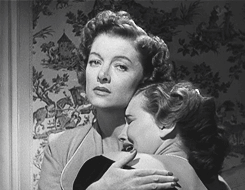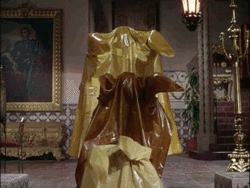I first saw this film (one of my top ten favorites) in 1995 on the big screen, as part of the commemorations for the 50th anniversary of the end of WWII. It had an impact that was so strong that it's never left me--I've seen it many times since, and with each viewing the film seems to reveal new artistic richness and spiritual depth.
William Wyler's direction is breathtaking. One of the most moving scenes occurs early on in the film, when Homer, the young disabled Navy veteran, arrives at his family home and stands for a moment on the front lawn. For that one second there is an exquisite stillness that communicates a depth of emotion that can't be expressed physically. Then, just as the tension becomes almost unbearable, Homer's little sister Louella comes to the front door and runs out to greet him. In a similar way, the scene where Al Stephenson comes home to his wife and children is so finely directed you can almost feel that you're in the apartment with them--that it's your husband or father come home to you from the war--and you're experiencing the sheer elation of their physical nearness.
This aspect of the film--its portrayal of the joys and hardships of post-war readjustment and the veterans' experience--is what makes it so enlightening, honest and powerful. As a young woman, I have never experienced wartime or had my father, brothers or friends go off to fight. The film moves swiftly but seamlessly from the initial joy of homecoming and reunion to the problems, anxieties and humiliations that the three veterans encounter as they attempt to build a new life for themselves and their families.
I found it interesting how the film tries to give a picture of the different socio-economic backgrounds of the three men, and show the emergence of an affluent, market-driven economy. While this in itself is not bad, different episodes in the film show how this economic approach can conflict sharply at times with enduring human values such as integrity and justice. Al's dealings with the young veteran Mr Novak, who comes to him for a service loan to buy a farm, and his later (slightly tipsy) speech to a business gathering show this. Al declares at the end of his speech that when the bank lends money to poor veterans it will be a financial gamble but "we'll be gambling on the future of this country".
The film's interweaving of the characters and their struggles never falters and is deeply satisfying. Even as Al and Milly, Homer and Wilma gradually move towards a happy resolution of their difficulties this positive strand of the film is counter-balanced by the focus on Fred, the courageous Air Force captain who, in the eyes of the commercial world is "unqualified", suitable only for a job at a soda fountain, and in the eyes of his war bride, Marie, is only wonderful when he's dressed up in his officer's uniform. Fred's situation seems only to deteriorate and at one point in the film, after he farewells his elderly father to leave town and look for work, the father finds the citations for Fred's medals and sits down to read them. As he reads the words describing Fred's bravery and dedication to duty while he was terribly wounded in his aircraft, Pat Derry's voice nearly breaks with pride and love for his son. The film beautifully juxtaposes Fred's unselfish conduct and willingness to make the ultimate sacrifice with the cold indifference of a country in peacetime that does not want him and seemingly has no place for him.
The actors are uniformly impressive and really make their characters come alive. Dana Andrews is especially outstanding together with two young actors making their debut, Harold Russell and Cathy O'Donnell, as Homer and Wilma. Personally, I loved Homer and Wilma's story the best among those of all the characters,and the resolution is a simple, sensitively shot scene that lifts the whole film to a new point of happiness, gratitude and release. Both Cathy O'Donnell and Teresa Wright are lovely, gifted actresses with a slightly understated style, that is perfectly suited to the film's restrained but powerful tenor. This is demonstrated especially well in the tense scene where Wilma tries to talk to Homer in the shed, and in the scene where Peggy confides her heartache to her parents.
One feature that adds significantly to the film's quality is Hugo Friedhofer's score. The music is remarkably fresh and undated, has a strong, classic sound, and is poignant without being too romantic or sentimental (a flaw often found in other 1940s film scores).
The producer, Samuel Goldwyn, reportedly said of this film: "I don't care if it doesn't make a nickel...I just want every man, woman and child in America to see it". Although I'm not American (I am Australian) I found this film, with its universal human themes and its portrayal of post-war readjustment, speaks to anyone who shares in this heritage of WWII. Tell others about this film--it is breathtaking, beautiful and brave. See it and remember.

































































































































